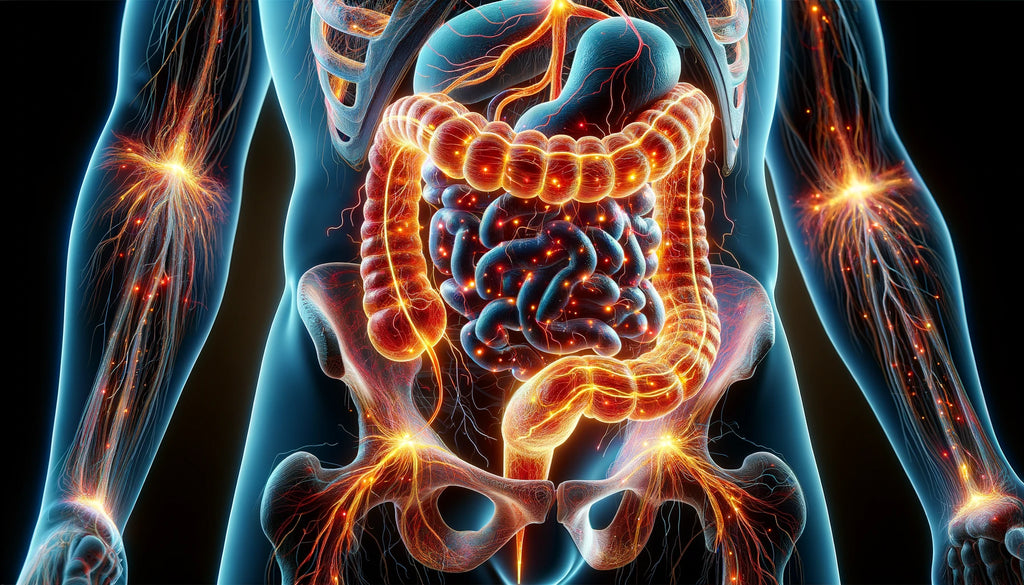Price :
QTY :
CART TOTALS :
There are items
in your cart
CART TOTALS :
Your shopping bag is empty
Go to the shop
In the landscape of health and wellness, probiotics have emerged as a cornerstone of natural health, promising improved digestion, stronger immune function, and even mental health benefits. With Netura's Probiotic 40 Billion with Prebiotics leading the charge, this guide explores the deep-seated benefits of integrating probiotics and prebiotics into your daily routine.
Probiotics are live microorganisms that, when administered in adequate amounts, confer a health benefit on the host. They are often referred to as "good" or "beneficial" bacteria because they help maintain the natural balance of organisms (microflora) in the intestines. The typical human digestive tract contains about 400 types of probiotic bacteria that reduce the growth of harmful bacteria and promote a healthy digestive system.
The most common groups of probiotics include Lactobacillus and Bifidobacterium. Each group comprises different species, and within each species, different strains. These beneficial microbes are naturally found in the human gut but can be depleted by poor diet, antibiotics, and stress. Supplementing with probiotics can help replenish them, aiding digestion and supporting immune function.
Prebiotics are non-digestible fibers that act as food for probiotics. When probiotics and prebiotics are combined, they form a symbiotic relationship. Prebiotics are found in whole grains, bananas, onions, garlic, honey, and artichokes. By providing food for probiotics, prebiotics help populate the gut with healthy bacteria and enhance the function of probiotics.
Unlike probiotics, which are living organisms, prebiotics are not affected by heat, cold, acid, or time. Therefore, they are easy to include in daily diets without concern for degradation, which can happen with probiotic foods or supplements if they are not properly stored or handled.
The combination of probiotics and prebiotics in a synbiotic relationship enhances the survivability and implantation of live probiotics in the gut, making them more effective. Synbiotics are particularly beneficial in promoting gastrointestinal health and enhancing immune function. This synergy not only helps in maintaining a healthy intestinal environment but also in protecting it against pathogenic bacteria and reducing the risk of gastrointestinal disorders.
The health benefits of probiotics and prebiotics extend beyond the gut. They have been shown to influence everything from allergies to mental health. Research suggests that they play a role in reducing the risk of developing allergic conditions by improving the immune system's tolerance. Emerging evidence also points to the gut-brain axis, a bidirectional communication system between the gut and the brain, suggesting that gut health can influence mental well-being, potentially improving symptoms of depression and anxiety.
Modern lifestyles and diets often inhibit the growth and activity of beneficial gut bacteria. Factors such as high-sugar diets, excessive sanitary practices, and the use of antibiotics contribute to the depletion of beneficial bacteria, leading to an imbalance that can manifest in allergies, digestive disorders, and even mental health issues. Integrating probiotics and prebiotics into one's diet is becoming increasingly recognized as a crucial strategy for maintaining gut health and overall well-being in the face of modern challenges.
By understanding the critical roles of probiotics and prebiotics in maintaining health, consumers are better equipped to make informed decisions about their diets and supplement paths. Netura’s Probiotic 40 Billion with Prebiotics offers a comprehensive approach to support this balance, promoting not only digestive health but a holistic sense of well-being.

One of the most intriguing scientific discoveries in recent years is the gut-brain axis, a complex communication network linking the gastrointestinal tract and the brain. This connection suggests that the gut can influence mental health and vice versa. Probiotics play a significant role in this relationship by producing and facilitating neurotransmitters and signaling molecules that can affect brain function. For instance, certain strains of probiotics are known to produce gamma-aminobutyric acid (GABA), which can help regulate feelings of anxiety and stress.
Research has consistently shown that probiotics can improve mental health outcomes. For example, a meta-analysis of 15 randomized controlled trials found that probiotics significantly decreased depression levels in participants compared to placebos. This evidence points to the potential of probiotics as part of a treatment plan for mood disorders.
The gastrointestinal tract is also the site of a large portion of the body's immune response, with about 70% of immune cells residing in the gut. This makes the gut an essential area for immune system support. Probiotics influence the gut’s immune system by enhancing the mucosal immune response and increasing the presence of immunoglobulin cells, which play a critical role in the immune barrier.
Probiotics contribute to immune function by reinforcing the gut barrier, preventing harmful pathogens from entering the bloodstream. This barrier enhancement helps prevent infections and can reduce the frequency of respiratory and gastrointestinal illnesses. Regular intake of probiotics has been shown to be particularly effective in reducing the number and duration of respiratory infections among children and adults.
Chronic diseases such as obesity, type 2 diabetes, and cardiovascular diseases have also been linked to the health of the gut microbiome. Probiotics may help manage these conditions by improving metabolism, reducing serum cholesterol, and regulating hormone levels.
For instance, certain probiotic strains influence the production of short-chain fatty acids, which can improve insulin sensitivity and reduce inflammation in the body. This modulation of inflammation and metabolic function underscores the potential of probiotics to support chronic disease management. Additionally, probiotics have been shown to influence the metabolism of bile acids, which in turn can affect cholesterol levels and gut hormone secretion involved in appetite regulation.
Antibiotics, while lifesaving, can severely disrupt the natural balance of the gut microbiota by killing beneficial bacteria along with harmful ones. This disruption can lead to antibiotic-associated diarrhea, a common side effect of antibiotic use. Probiotics can help restore the balance of gut flora after antibiotic treatment, reducing the incidence and severity of diarrhea. They can also help combat other antibiotic-related health issues, such as Candida overgrowth, by reinstating healthy levels of beneficial bacteria.
Probiotics are synonymous with digestive health, often cited as the solution to a myriad of gastrointestinal issues. The digestive system, a complex array of organs responsible for breaking down food, absorbing nutrients, and eliminating waste, benefits significantly from the equilibrium probiotics provide. They help maintain this balance by combating harmful bacteria and producing natural antibiotics and acids that reduce the growth of pathogens.
Clinical studies highlight the effectiveness of probiotics in treating conditions such as irritable bowel syndrome (IBS), a common disorder causing symptoms like cramping, abdominal pain, bloating, gas, and diarrhea or constipation. Probiotics can help modulate the gut environment, reducing inflammation and normalizing bowel movements. They are also used in the management of inflammatory bowel diseases, such as Crohn's disease and ulcerative colitis, by helping to maintain remission and prevent relapses.
Building on the gut-brain axis discussed in the previous chapter, probiotics play a crucial role in mental health by influencing the production of neurotransmitters and modulating systemic inflammatory processes that are often implicated in mood disorders. For instance, certain probiotic strains can produce and stimulate the pathways of serotonin and dopamine, neurotransmitters that play a key role in regulating mood and emotion.
A pioneering study found that participants who took probiotics daily reported significantly less psychological distress than those who did not. This correlation suggests that probiotics could be a complementary therapy for depression and anxiety, offering a natural approach with few side effects compared to traditional pharmaceutical treatments.
Probiotics' role in managing body weight and preventing obesity is another exciting area of research. Certain strains of probiotics influence the way the body metabolizes food and stores fat. They may increase levels of proteins like ANGPTL4, which can lead to decreased fat storage. Moreover, probiotics can influence appetite-regulating hormones, leading to reduced caloric intake and a natural decline in body weight.
Studies also show that the gut microbiota in obese individuals differs significantly from those in lean individuals. By modifying the gut microbiota composition, probiotics may help prevent weight gain in people at risk of obesity, highlighting their potential role in weight management and metabolic health.
Probiotics have beneficial effects on skin health, particularly in treating conditions like eczema, acne, and rosacea. They help by strengthening the skin’s barrier function, reducing inflammation, and preventing the colonization of harmful pathogens. Clinical trials have shown that eczema symptoms improve significantly with probiotic supplements, especially in children and infants. For acne and rosacea, probiotics can help reduce flare-ups and skin redness through their anti-inflammatory properties and modulation of the skin’s immune system.
Netura's Probiotic 40 Billion with Prebiotics includes a variety of probiotic strains, each known for specific health-related functions. These strains are combined with prebiotics to enhance their efficacy by providing a nutrient-rich environment conducive to their growth.
Key Probiotic Strains Included:
The combination of these strains aims to provide a comprehensive approach to supporting the gastrointestinal flora and overall digestive health.
While individual results can vary widely, clinical studies generally support the beneficial effects of probiotics on digestive and immune health. Probiotics, including the strains found in Netura’s product, have been observed to:
For those considering probiotic supplements, it's important to understand that the effectiveness can depend on several factors including the dose, frequency, and the individual’s existing gut flora. Generally, consistent daily consumption is recommended to see potential benefits. Users should also consider their dietary habits and overall lifestyle as these can significantly influence gut health.
When choosing probiotic supplements, it's crucial to consider the quality and safety standards of the manufacturing process. Products should ideally be produced in facilities that follow Good Manufacturing Practices (GMP) to ensure product safety and efficacy. Additionally, consumers should look for products that provide transparency about the strains used and their CFU (colony-forming units) counts to gauge potency.
The field of probiotic research is continuously evolving, with new studies regularly providing deeper insights into how different strains affect the human body. Future advancements may lead to more personalized probiotic formulations designed to address specific health concerns based on individual microbiome data.
Incorporating probiotics into your diet doesn't solely depend on supplements; many foods are naturally rich in these beneficial bacteria. Here’s a look at some probiotic-rich foods that can enhance your gut flora:
Incorporating these foods into your diet can contribute to a balanced microbiome and offer a variety of other health benefits due to their nutrient content.
While natural food sources of probiotics are beneficial, they might not always provide enough of these bacteria to meet the body's needs, especially in people with specific health conditions or those recovering from antibiotic use. Here's how you can effectively combine foods and supplements:

To maximize the benefits of probiotics, whether from food or supplements, integrating prebiotics into your diet is essential. Prebiotics are fibers that the human body cannot digest, serving as food for probiotics. Foods rich in prebiotics include:
Here are some tips to help you increase the intake of probiotics and prebiotics:
In conclusion, the journey through the world of probiotics and prebiotics reveals their critical role in maintaining and enhancing our health. From improving gut health and strengthening the immune system to impacting mental health and weight management, the benefits of these microorganisms are vast and profound. As we continue to uncover the intricate connections between our microbiome and overall health, it becomes clear that a proactive approach to incorporating these beneficial bacteria into our diets can lead to substantial health improvements. Whether through foods naturally rich in probiotics and prebiotics or through high-quality supplements like Netura's Probiotic 40 Billion with Prebiotics, each step towards a balanced gut is a step towards a healthier life.
What are probiotics?
Probiotics are live microorganisms, primarily bacteria, that are similar to beneficial microorganisms found in the human gut. They are often referred to as "good" bacteria and are consumed through fermented foods or supplements.
What are prebiotics?
Prebiotics are types of dietary fiber that feed the friendly bacteria in the gut. They help promote the growth of beneficial bacteria, enhancing the effectiveness of probiotics.
How do probiotics and prebiotics benefit health?
Together, probiotics and prebiotics can improve gut health, enhance immune function, aid in weight management, and potentially reduce the risk of chronic diseases. They also play a role in improving mental health through the gut-brain axis.
Can probiotics help with weight loss?
Some studies suggest that certain strains of probiotics can help with weight loss and body fat reduction by influencing appetite and energy usage through the gut microbiome.
Are there any side effects of taking probiotics?
Probiotics are generally safe and well-tolerated. However, some people may experience mild side effects, especially initially, such as gas, bloating, or diarrhea. These usually resolve on their own as the body adjusts.
How should I choose a probiotic supplement?
Look for supplements that specify the strains of bacteria they contain and their CFU (colony-forming units) count. It's also important to choose products from reputable manufacturers that adhere to good manufacturing practices.
Can I get enough probiotics from food?
While many fermented foods contain probiotics, the quantity and quality can vary greatly depending on the food and how it’s processed. Supplements can provide more controlled doses but incorporating fermented foods into your diet is also beneficial.
For more in-depth information on the benefits of probiotics and prebiotics, explore these scientific articles:
No comments
0 comments